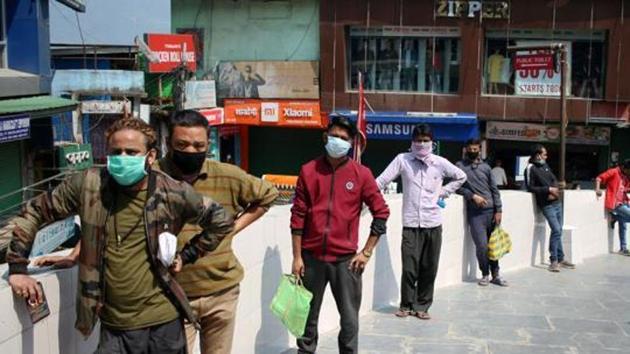WHO changes stance, calls for 3-layer Covid-19 masks in public
Wearing masks in public is already compulsory or recommended for everyone in some countries, including India, Singapore, France, Spain, Germany and Argentina, among others.
In a big shift from its earlier position, the World Health Organisation (WHO) has issued new guidelines that say everyone should wear a three-layer fabric or non-medical mask in public to prevent the spread of the coronavirus disease (Covid-19).

People aged above 60 years or with health issues should wear a medical mask in settings where social distancing is difficult, and all others should wear a three-layer fabric mask that acts as “a barrier for potentially infectious droplets,” according to the new guidelines released on Friday.
“In light of evolving evidence, WHO advises that governments should encourage the general public to wear masks where there is widespread transmission and physical distancing is difficult, such as on public transport, in shops or in other confined or crowded environments... Based on this new research, WHO advises that fabric masks should consist of at least three layers of different material,” said Dr Tedros Adhanom Ghebreyesus, director-general of WHO.
Coronavirus outbreak: Full coverage
Wearing masks in public is already compulsory or recommended for everyone in some countries, including India, Singapore, France, Spain, Germany and Argentina, among others.

Those wearing a cloth mask should choose a three-layer fabric mask made of absorbent cotton closest to the face, followed by a polypropylene layer and then a synthetic layer that is fluid-resistant, WHO said.
The advisory includes tips on how to don and doff, discard or reuse masks . “People can potentially infect themselves if they use contaminated hands to adjust a mask, or to repeatedly take it off and put it on, without cleaning hands in between. Masks can also create a false sense of security, leading people to neglect measures such as hand hygiene and physical distancing,” said Dr Tedros.
Previous WHO guidelines limited mask use to healthcare workers, healthy people taking care of suspected or confirmed Covid-19 patients, and people coughing and sneezing. The health agency was against universal use because of fears that a scramble for masks would lead to shortages and deprive those who really need them of masks.
The new guidance follows research commissioned by the global health agency that found that wearing masks and keeping a distance of two metres from others are the most effective ways of stopping the spread of Covid-19. But these interventions, even when properly used and combined, do not offer complete protection from infection when used alone, and must be used with other protective measures, such as hand hygiene, found a review of 172 studies from 16 countries published in The Lancet, on June 2. “Based on the available evidence on physical distancing, face masks, eye protection and handwashing, we cannot say which one is best at this point. They are all effective, but the combination of those interventions it likely better than any of the interventions alone,” said study co-lead Professor Holger Schünemann of the department of Health Research Methods, Evidence and Impact at McMaster University in Canada, in an email.
The study also found that respirators and multi-layer masks are more protective than single-layer masks. “This finding is vital to inform the proliferation of home-made cloth mask designs, many of which are single-layered. A well designed cloth mask should have water-resistant fabric, multiple layers, and good facial fit… Universal face mask use might enable safe lifting of restrictions in communities seeking to resume normal activities and could protect people in crowded public settings and within households,” said Professor Raina MacIntyre from the Kirby Institute, University of New South Wales in Australia, in an accompanying comment. She was not involved in the study.
With the pandemic yet to peak in India, protective behaviours are critical to stop the spread of the disease. “We need very strict wearing of masks, social distancing and frequent handwashing. I would say, we literally need policing of masks and other social distancing behaviours to enforce compliance whenever you’re out, whether it is in public transport, office, school or a market,” said Dr Randeep Guleria, director, All India Institute of Medical Sciences, New Delhi.
Current evidence suggests that Covid-19 is most commonly spread by respiratory droplets, especially when people cough and sneeze, entering through the eyes, nose, and mouth, either directly or by touching a contaminated surface, but there is increasing concern about spread through aerosols, which are tiny saliva and vapour droplets suspended in air that are produced when we speak or breathe.
“I cannot say this clearly enough: masks alone will not protect you from Covid-19. Masks are not a replacement for physical distancing, hand hygiene and other public health measures. Masks are only of benefit as part of a comprehensive approach in the fight against Covid-19,” said Tedros.
“The cornerstone of the response in every country must be to find, isolate, test and care for every case, and to trace and quarantine every contact. That is what we know works. That is every country’s best defence against Covid-19,” he said.
Get Current Updates on India News, Lok Sabha election 2024 live, Election 2024 along with Latest News and Top Headlines from India and around the world.




